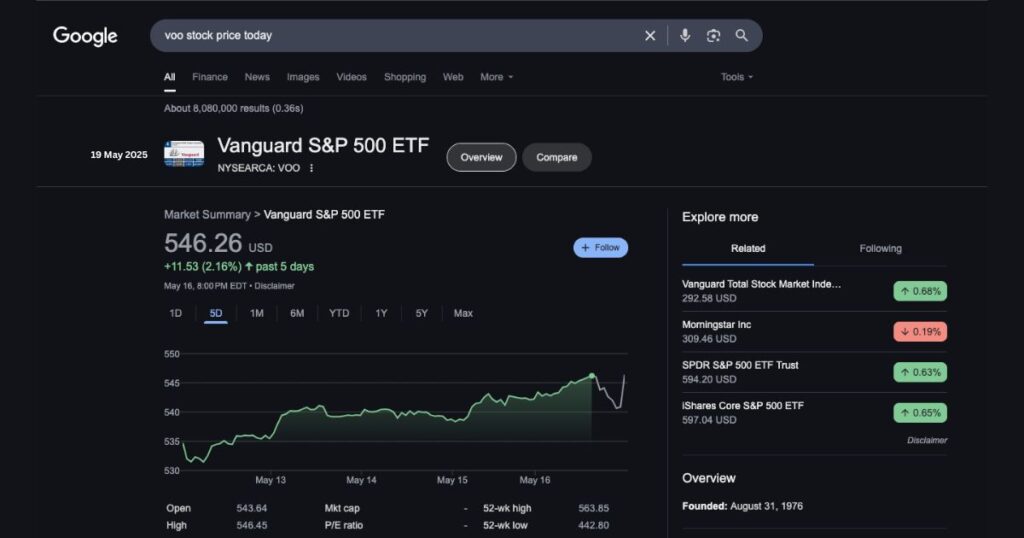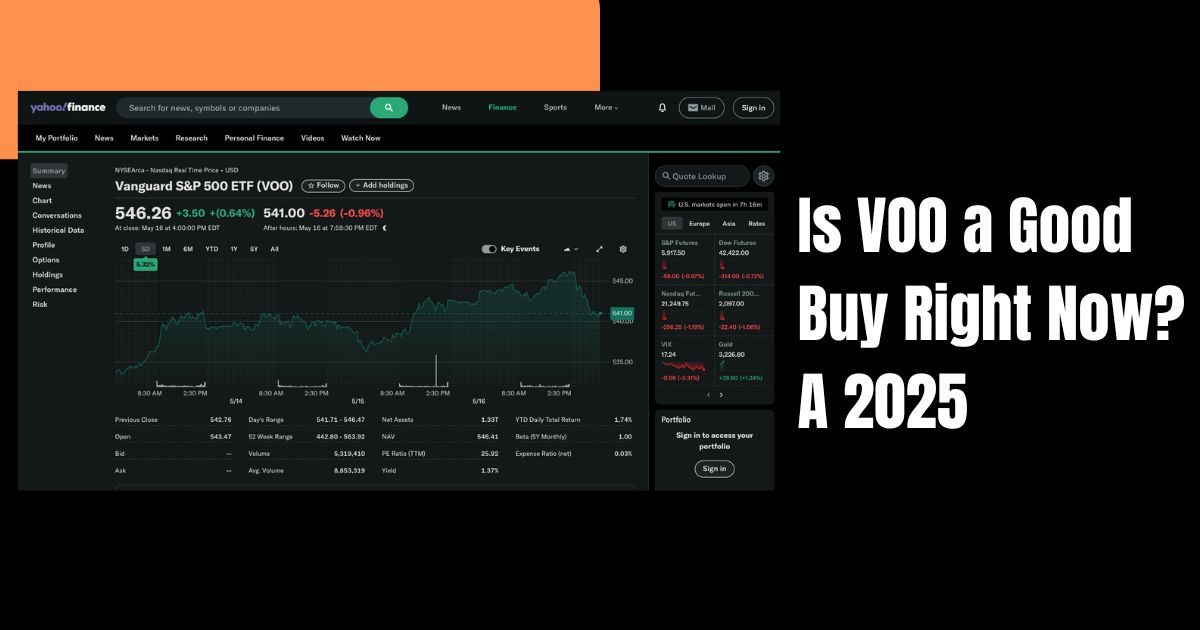Is Now the Right Time to Buy VOO? A 2025 Investment Analysis
If you’re scanning the markets in 2025 and wondering where to park your money, the Vanguard S&P 500 ETF (VOO) likely stands out. With rising interest in passive investing, low-fee ETFs, and long-term portfolio resilience, many investors are asking: “Is VOO a good buy right now?” This deep dive into VOO stock, VOO ETF price, and long-term trends aims to help you make an informed decision.
Also, we’ll explore VOO stock, its potential in today’s market, and how Beem, #1 AI-powered Smart Wallet App in the US, can help you become smarter.
What Is VOO and Why Is It So Popular?
The Vanguard S&P 500 ETF (VOO) is a low-cost fund designed to mirror the performance of the S&P 500—an index composed of 500 of the largest U.S. companies.
Whether you’re a seasoned investor or just beginning your financial journey, VOO offers a straightforward way to gain exposure to the broader U.S. equity market.
VOO stock is favored for its reliability, cost-effectiveness, and alignment with the broader market. If you’ve looked up the VOO share price or tracked its returns over time, you know it closely shadows the S&P 500. The appeal is simple: by owning VOO, you’re essentially buying into America’s biggest businesses—Apple, Microsoft, Amazon, and many others.
Beem encourages users to think long-term when it comes to money. That’s why VOO stock—a low-risk, diversified ETF—fits so well with the financial planning features available in the Beem app.
VOO Stock Price Today – May 17, 2025
As of May 17, 2025, the Vanguard S&P 500 ETF (VOO) is trading at $546.26, marking a modest increase of 0.64% from the previous close.
The day’s price range spans from a low of $540.01 to a high of $546.33, reflecting steady investor interest. The ETF’s trading volume has crossed 7.25 million shares, showing sustained demand from both retail and institutional investors.
VOO mirrors the performance of the S&P 500 index, offering exposure to 500 leading U.S. companies across sectors. Its extremely low expense ratio (0.03%) and a consistent dividend yield (~1.28%) make it a preferred choice for long-term investors.
Despite fluctuations in the broader market, VOO’s price stability and growth potential remain strong. Analysts continue to favor the ETF for its broad diversification and cost-efficiency, especially for those building retirement portfolios or passive investment strategies.
Last updated: May 17, 2025, 00:19 UTC

*Is VOO Stock a Good Buy Right Now? What You Should Consider When Buying Voo Stock?*
Figuring out if VOO stock is a good buy right now isn’t about finding a perfect entry point—because perfect timing rarely works. The market is unpredictable, and even seasoned investors can’t consistently buy low and sell high. That’s why many experts suggest a long-term approach instead of trying to time the market.
VOO ETF represents the full U.S. stock market through the S&P 500. Over the years, it has weathered volatility and delivered steady growth. But whether it’s right for you today depends on several personal factors—like how long you plan to invest, your comfort with market ups and downs, and your current financial goals.
If you’re investing for retirement 10+ years from now, temporary dips in the VOO share price may not matter much. But if you’re saving for a short-term goal, timing could matter more. A popular strategy is dollar-cost averaging, where you invest the same amount regularly, no matter the VOO ETF price—helping you avoid buying only at market highs.
Before making a decision, think about your financial situation and goals. And remember: while VOO stock history is strong, past performance isn’t a guarantee of future returns.
VOO as an Investment: How It Works and What It Offers
Unlike actively managed funds, VOO ETF passively tracks its benchmark index. This means lower fees, minimal human error, and less turnover. Its expense ratio, one of the lowest in the industry, is just 0.03%, which helps boost long-term compounding returns.
Buying VOO stock is as simple as purchasing any other equity. It trades throughout the day on major exchanges, and its VOO ETF price fluctuates in real-time. For long-term investors, this liquidity adds flexibility, allowing them to average in or out depending on their financial goals.
Another major benefit is the VOO dividend yield, which provides passive income alongside capital appreciation.
As of 2025, the VOO dividend yield hovers around 1.5% to 1.7%, depending on market conditions. Though not high, it’s consistent and tax-efficient for many investors.
Should You Buy VOO in 2025? Timing, Trends, and Economic Signals
So, back to the core question: Is VOO a good buy right now? The answer lies in examining macroeconomic trends, current market valuation, and your own investing horizon.
1. Market Valuation
In early 2025, the VOO ETF price has seen a healthy rebound from mid-2023’s volatility. As of Q1 2025, VOO stock price is sitting at historical highs—but does that make it overvalued?
Not necessarily. The forward P/E ratio of the S&P 500 sits at around 18x, which is close to the 10-year average. This suggests that while VOO share price may not be “cheap,” it isn’t dramatically overpriced either.
2. Economic Outlook
With inflation stabilizing and the Federal Reserve taking a more dovish stance on rate hikes, investor sentiment has improved. In this environment, ETFs like VOO stock tend to perform well as money flows back into equities.
However, macro risks remain: geopolitical tensions, tech sector volatility, and the possibility of a mild recession still linger. In uncertain times, diversified exposure through something like VOO ETF makes strategic sense.
3. Dollar-Cost Averaging Strategy
Rather than trying to “time” the perfect entry for VOO stock, many investors choose to invest regularly. This helps mitigate short-term volatility in the VOO ETF price and smoothens the investment curve.
VOO vs. Other Investment Options: How It Stacks Up
Let’s compare VOO ETF with some of its popular peers:
VOO vs. QQQ (Nasdaq-100)
While QQQ focuses heavily on tech, VOO ETF is more diversified across all sectors. If you’re worried about tech overexposure, VOO is the safer play. However, in booming bull markets, QQQ may offer higher short-term gains.
VOO vs. SPY
SPY is another S&P 500 ETF, but it comes with a slightly higher expense ratio (0.09% vs. 0.03% for VOO ETF). Over time, that fee difference matters, especially in large portfolios. That’s why VOO stock is often preferred for long-term holds.
VOO vs. Individual Stocks
Individual stocks may offer higher returns but also carry greater risk. With VOO stock, you eliminate the “single-stock risk” by owning a diversified basket. This makes VOO ETF more suitable for retirement portfolios and risk-averse investors.
Building Financial Wellness with VOO Stock
If your goal is long-term wealth and financial peace of mind, VOO ETF can be a powerful tool. Here’s how:
1. Steady Growth Over Time
Looking at the VOO stock history, it’s clear that despite market pullbacks, the long-term trajectory remains upward. From its inception in 2010 to 2025, VOO share price has nearly quadrupled.
2. Dividends as Passive Income
The VOO dividend yield provides a steady stream of income, which can be reinvested to maximize growth. Over a 10+ year period, reinvested dividends can significantly enhance returns.
3. Simple Portfolio Building
With just one investment—VOO stock—you get exposure to 500 of the largest U.S. companies. This simplifies decision-making and reduces emotional investing.
Key Metrics and Historical Data You Should Know
Let’s break down some vital statistics as of May 2025:
| Metric | Value |
|---|---|
| VOO ETF Price | ~$445 |
| VOO Dividend Yield | ~1.6% |
| 5-Year CAGR | ~11.8% |
| Expense Ratio | 0.03% |
| Number of Holdings | 500+ (S&P 500) |
| Launch Date | 2010 |
| VOO Stock History High | $445 (2025) |
The consistency in VOO ETF price and historical performance makes it a low-maintenance, high-reliability asset for long-term portfolios.
VOO FAQs: What People Want to Know in 2025
Is VOO stock safe?
While no investment is risk-free, VOO stock is among the most stable equity investments available due to its diversification and low fees.
What is the current VOO stock price?
As of May 2025, the VOO stock price is approximately $445. However, it fluctuates based on the broader market.
Does VOO pay dividends?
Yes, VOO dividend yield currently sits around 1.6%. These are paid quarterly and can be reinvested or taken as income.
What’s better: VOO or individual stocks?
For long-term growth with lower risk, VOO stock is often better than picking individual stocks, unless you have the expertise and time to manage a stock portfolio.
How has VOO stock performed over time?
The VOO stock history shows consistent growth, with average annual returns of 10–12% over the last decade, including dividend reinvestment.
Can I lose money with VOO ETF?
Yes, like all equity investments, VOO ETF price can decline in the short term. But historically, VOO has recovered and grown over time.
What account should I use to buy VOO?
You can buy VOO stock in most brokerage accounts. For tax efficiency, consider holding it in an IRA or 401(k).
What is VOO?
VOO is the Vanguard S&P 500 ETF, a low-cost exchange-traded fund that tracks the performance of the S&P 500 Index, representing 500 of the largest U.S. companies.
What are the benefits of investing in VOO?
VOO offers broad market exposure, low fees, and consistent long-term growth, making it a popular choice for passive investors.
Is VOO risky?
Like any stock market investment, VOO carries some risk, but its diversification across 500 companies helps reduce overall volatility.
How is VOO different from an S&P 500 mutual fund?
VOO is an ETF traded like a stock with lower expense ratios, while mutual funds may have higher fees and are bought/sold at end-of-day prices.
What is the 10 year return on VOO?
As of 2025, VOO’s 10-year average annual return is approximately 10–12%, including dividends.
Is VOO a good buy right now?
VOO remains a strong long-term investment, especially for those seeking diversified exposure to the U.S. stock market. Timing depends on your personal financial goals.
What is the top 3 ETF?
Top ETFs by popularity and assets include VOO (Vanguard S&P 500), SPY (SPDR S&P 500), and QQQ (Invesco Nasdaq-100).
Who owns the most shares of VOO?
Large institutional investors such as Vanguard Group, BlackRock, and Charles Schwab are among the biggest holders of VOO shares.
Which is the best S&P 500 ETF?
VOO, SPY, and IVV are top contenders. VOO is often preferred for its low expense ratio and strong tracking accuracy.
Should I buy VOO or VGT?
VOO provides diversified exposure to the full S&P 500, while VGT focuses on tech. Your choice depends on your risk tolerance and sector preference.
Need quick cash to invest in the VOO ETF? Beem Everdraft™ gives you instant access to $10-$1,000 with no credit check, no due dates, no income restrictions and no hidden fees. Use it to seize investment opportunities when they matter most—fast, flexible, and hassle-free financial support, right when you need it.
Final Thoughts: Is It the Right Time to Invest in VOO ETF?
Timing the market is tricky—but building wealth isn’t. Whether you’re 25 or 55, VOO stock is one of the simplest and most effective ways to grow your savings.
In 2025, the market outlook is cautiously optimistic. With inflation cooling and earnings stabilizing, now may be a strategic entry point to begin or expand your position in VOO ETF. The combination of diversification, dividend yield, historical strength, and low costs makes VOO stock a cornerstone for many portfolios.
So, is VOO a good buy right now? If your goal is long-term financial growth, the answer is a confident yes.
*Disclaimer: Beem is not a registered investment advisor and does not provide personalized financial, investment, or legal advice. The information shared in this article is for general informational purposes only and reflects our opinions at the time of publication. Any investment decisions you make based on this content are made at your own risk. Beem assumes no responsibility or liability for any financial losses or decisions made based on this content. Always consult a licensed financial advisor before making investment choices.






